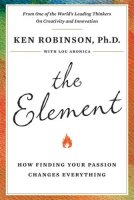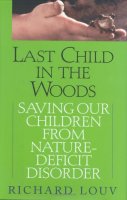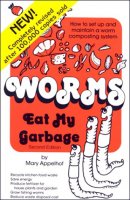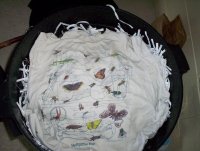Making vegetables grow in our nutrient-poor, nematode-rich sand soil is always a challenge. After the initial shock of moving here from a world where one puts the seeds in the ground and stands back, we pretty much gave up on gardens until a couple of years ago. We do a little better each year, but at least financially the balance sheet is still dismal.
One plant that is still thriving, even in the oppressive Florida summer heat, is our lemon balm. We planted it this year for no other reason than that it was available at Lowes (or Home Depot, I forget which) and I remembered that Porter had remarked on how good it smelled when we encountered it at Leu Gardens. We let it grow untouched for a long time, mostly because I didn't know what to do with it, but when a friend mentioned making lemon balm tea, I had my answer.
Now I brew a pot of tea with one regular PG Tips tea bag and a handful of bruised, fresh lemon balm leaves. I don't know how it tastes hot, as we're not in that season, but I can attest that it makes a wonderful iced tea. I generally prefer my tea unflavored, but at least for now I can't get enough of this delicious combination.
The worms have completely devoured their Carnegie Mellon t-shirt moisture mat, except for places—stitching, and part of the design, I think—that were not natural fiber. Therefore, since they are now more mature, and have clearly excelled in their majors of eating and excreting, I hereby declare that they have graduated, and confer upon them a new moisture mat.
It's possible they may end up in grad school—we have a couple of University of Rochester t-shirts that are getting on the worn side—but for now they are enjoying their venture into the wide invertebrate world. (Or not so wide. We still insist they stay in their dorm-turned-apartment.)Permalink | Read 3023 times | Comments (0)
Category Everyday Life: [first] [previous] [next] [newest] Conservationist Living: [first] [previous] [next] [newest]
I'm thinking of moving to Canada, and it has nothing to do with avoiding the draft, nor with frustrations over our current political direction, nor because of the recent heat wave in which our near-100-degree daytime temperatures "cooled down" all the way to 85 in the middle of the night—and not even because Canada ranks close to Switzerland and New Zealand at the top of my list of the world's most beautiful places. No, what makes being Canadian particularly attractive at the moment is this study of the relationship between body mass index and death of more than 10,000 Canadian adults.
Researchers found that while underweight and extremely obese people die earlier than people of a normal weight, people who are slightly overweight actually live longer than those of a normal weight.
[U]nderweight people were 70 percent more likely than people of normal weight to die, and extremely obese people were 36 percent more likely to die. But overweight individuals were 17 percent less likely to die. The relative risk for obese people was nearly the same as for people of normal weight.
[T]his was the first large Canadian study to show that people who are overweight may actually live longer than those of normal weight.
But wait...there's good news...I may not have to move after all:
Gotta love medical studies. You can find one that proves whatever you want. Now to get my hands on a copy of Chocolate Unwrapped: The Surprising Heath Benefits of America's Favorite Passion.An earlier study, conducted in the United States and published in 2005 in the Journal of the American Medical Association, showed similar results.
I know enough about my computer's software to get by; in fact, I know enough to do many wonderful things. But what I don't know exceeds what I do to a depressing degree. Only today did I stumble upon the fact that with Office 2007 I can publish documents in Adobe Acrobat (pdf) format.
It's not obvious, because there's an add-on required, but the add-on is free and available from Microsoft. It's a quick and very easy download and installation process; it would have taken less than a minute had I not bothered to read the directions and the license agreement. :)
I don't know what I'll use this new-found ability for, but now that I know about it, I'm sure I'll think of something.I'm filling out a political survey. My friends can now pick themselves up off the floor, as they know that in our house such things go immediately into the trash without passing Go. Political surveys, from either party, are inane nonesense with loaded questions on the order of, "You certainly don't support our evil opposition's murderous polices, do you?" and of which the true purpose is to solicit contributions. But this survey is different. Oh, it's inane, all right, with all of the above problems. But this survey, which is REGISTERED IN MY NAME ONLY and MUST BE ACCOUNTED FOR, which requires my immedate attention, and which assures me that my answers are important in the battle against the Obama Democrats' aggressive push to expand the federal government into every area of our lives and businesses; this survey from the National Republican Senatorial Committee that is sent only to a select few to represent ALL Republicans living in my voting district because it is cost-prohibitive to send a Survey to every registered Republican in my area; this survey is addressed to me.
It appears to have escaped the attention of the National Republican Senatorial Committee that I've been a registered Democrat for all 38 years of my voting life.
Well, I commend them, inane questions or no, for reaching out to the opposition even at the cost of slighting the registered Republicans. I hope they enjoy my answers, which for some questions will indeed sound as if I were "one of them" and for others will leave them scratching their heads. But they're not getting the $11 contribution they ask for "to help cover the cost of tabulating and redistributing my Survey," even though $11 isn't out of line for a days' amusement.To prove the Front Porch Republic isn't all academic discussions of too much length and intensity for the casual reader, check out Animals Were Definitely Harmed in the Production of this Story, explaining why, unlike modern movies, farm life entails "‘the harming of animals of every shape and in every fashion."
The story is less morbid than amusing, and rings true to life outside of Hollywood. Here are a few excerpts to tempt you. (More)Permalink | Read 2456 times | Comments (0)
Category Just for Fun: [first] [previous] [next] [newest]
What a wonderful bird the frog are
When he stand he sit almos';
When he hop he fly almos'.
He ain't got no sense hardly;
He ain't got no tail hardly either.
When he sit, he sit on what he ain't got—almos'.
Permalink | Read 2576 times | Comments (1)
Category Everyday Life: [first] [previous] [next] [newest]
 The Element: How Finding Your Passion Changes Everything, by Ken Robinson (Viking, New York, 2009)
The Element: How Finding Your Passion Changes Everything, by Ken Robinson (Viking, New York, 2009)
I use the term the Element to describe the place where the things we love to do and the things we are good at come together. I believe it is essential that each of us find his or her Element, not simply because it will make us more fulfilled but because, as the world evolves, the very future of our communities and institutions will depend on it.
Robinson is convincing enough, and encouraging in his belief that it is never too late to find and nurture one's Element, but he is frustratingly short on practical advice. So many of the examples he gives are of people who knew from childhood what they were good at, and what they wanted to do. They may have been obstructed at every turn, may not have been able to do what they knew they were born for until much later in life, but at least they knew.
Now, I can quickly name three passions that at least begin to stir in me the excitement he speaks of, what another friend refers to as the "fire in the belly": writing, education, and genealogy. But not only were they not passions of mine during the years when I was in school and presumably focusing and honing my skills for the future, they were actually anti-passions: I disliked my English and history classes, had negative interest in family stories, and teaching was not even in the vicinity of my career thoughts. Nothing excited me, really. I focused on science and math because I was good at them, which kept me going until some point in college, when they no longer came easily and my fair-to-middling interest was not sufficient to inspire the hard work necessary to master them. How do we help the me's of this world to find their Element?
Here are some fairly random excerpts to give you a taste:
[I]ssues of attitude are of paramount importance in finding your Element. A strong will to be yourself is an indomitable force. Without it, even a person in perfect physical shape is at a comparative disadvantage. In my experience, most people have to face internal obstacles of self-doubt and fear as much as any external obstacles of circumstance and opportunity....Fear is perhaps the most common obstacle to finding your Element. You might ask how often it's played a part in your own life and held you back from doing the things you desperately wanted to try.
[Richard Wiseman, author of The Luck Factor] has identified four principles that characterize lucky people. Lucky people tend to maximize chance opportunities. They are especially adept at creating, noticing, and acting upon these opportunities when they arise. Second, they tend to be very effective at listening to their intuition, and do work (such as meditation) that is designed to boost their intuitive abilities. The third principle is that lucky people tend to expect to be lucky, creating a series of self-fulfilling prophecies because they go into the world anticipating a positive outcome. Last, lucky people have an attitude that allows them to turn bad luck to good. They don't allow ill fortune to overwhelm them, and they move quickly to take control of the situation when it isn't going well for them.
Effective mentors push us past what we see as our limits. Much as they don't allow us to succumb to self-doubt, they also prevent us from doing less with our lives than we can. A true mentor reminds us that our goal should never be to be "average" at our pursuits.
There is abundant evidence that opportunities to discover our Element exist more frequently in our lives than many might believe....I don't mean to say, of course, that we all can do anything at any time in our lives. If you're about to turn one hundred, it's unlikely that you're going to nail the leading role in Swan Lake, especially if you have no previous dance background....Some dreams truly are "impossible dreams." However, many aren't. Knowing the difference is often one of the first steps to finding your Element, because if you can see the chances of making a dream come true, you can also likely see the necessary next steps you need to take toward achieving it.
In "The Pro-Am Revolution," a report for the British think tank Demos, Charles Leadbeater and Paul Miller underline the rise of a type of amateur that works at increasingly higher standards and generates breakthroughs sometimes greater than those made by professionals—hence the term Pro-Am....[They] call Pro-Ams "a new social hybrid," noting that they pursue their passions outside of the workplace, but with an energy and dedication rarely given to acts of leisure. Pro-Ams find this level of intensity restorative, often helping to compensate for less-than-inspiring jobs.
In the last part of the book, Robinson deals with reforming, or rather transforming our educational system.
Public education puts relentless pressure on its students to conform. Public schools were not only created in the interests of industrialism—they were created in the image of industrialism. In many ways, they reflect the factory culture they were designed to support....This system has had many benefits and successes. It has done well for many people whose real strength is conventional academic work, and most people who go through thirteen years of public education are at least moderately literate and capable of making change for a twenty. But dropout rates, especially in the United States, are extraordinarily high, and levels of disaffection among students, teachers, and parents are higher still.
Used the right way, standardized tests can provide essential data to support and improve education. The problem comes when these tests become more than simply a tool of education and turn into a focus of it.
Many of the people I've talked about in this book say that they went through the whole of their education without really discovering their true talents. It is no exaggeration to say that many of them did not discover their real abilities until after they left school—until they had recovered from their education. As I said at the outset, I don't believe that teachers are causing this problem. It's a systemic problem in the nature of our education systems. In fact, the real challenges for education will only be met by empowering passionate and creative teachers and by firing up the imaginations and motivations of the students.
Too many reform movements in education are designed to make education teacher-proof. The most successful systems in the world take the opposite view. They invest in teachers. The reason is that people succeed best when they have others who understand their talents, challenges, and abilities. This is why mentoring is such a helpful force in so many peoples' lives. Great teachers have always understood that [their] real role is not to teach subjects but to teach students. Mentoring and coaching is the vital pulse of a living system of education.
On June 12—tomorrow—Food, Inc. opens. As usual, we'll probably wait for the DVD, but it's definitely one I want to see. Do I really want to hear more about the dangers of our factory farming system? Unfortunately, yes. True, it produces plenteous, apparenly low-cost food—we spend less of our paychecks on food than in any time in our history—but the true costs are hidden, and high. Did you know that 90% of the items in our grocery stores contain some form of corn or soy? That our supply of beef, chicken, potatoes, and many other foods is driven by the fast-food industry? One reason I'm looking forward to the movie is that supposedly it is not entirely a doom and gloom horror flick, but also celebrates the power of the individual to make a difference. We shall see. Thanks to DSTB for the alert.
Here's the official Food, Inc. website, where you can see the trailer.
And a PBS show about the movie.
 Last Child in the Woods: Saving Our Children from Nature-Deficit Disorder, by Richard Louv (Algonquin Books, Chapel Hill, North Carolina, 2005)
Last Child in the Woods: Saving Our Children from Nature-Deficit Disorder, by Richard Louv (Algonquin Books, Chapel Hill, North Carolina, 2005)
I'm sorry to say I gave this book short shrift, but reading time has been scarce lately, and I must return it to the library today. I can say, however, that it is a must-read for anyone who is not already convinced that children need, as one of life's basic necessities, plenty of time in the natural world: hiking, camping, and learning with their families, building forts and tree houses, exploring on their own, and just being in the world of bugs and fish, stars and sand dunes, trees and caverns. If for you this kind of exhortation is preaching to the choir, it's probably still worth at least skimming it as much as I did, if only for the shock value of learning that today's children are even more cut off from such activities than you had imagined. (More)
In another context, someone asked if the folks at the Front Porch Republic were Presbyterian. I spent a little time trying to determine the answer, without success. From the writings, I'm pretty sure some are Catholic, and others, if not Presbyterian, would at least own the label "Reformed." Darryl Hart, who has thus far contributed two essays, would not least but most own that label, and "Presbyterian" as well, being an elder in the Orthodox Presybyterian church. This unfortunately evokes an automatic negative reaction from me, both personal and theological, but as I've mentioned several times before, God seems to have taken on as a special project this year the task of teaching me that those with whom I do not get along are sometimes right, and always have important things to teach me.
In this case, I'm pointing you to Hart's latest post, John Calvin and the Land of Chocolate, because of the prominent display of the Swiss flag (correct shape and all), and his kind remarks concerning my country-in-law. (More)Permalink | Read 2598 times | Comments (0)
Category Random Musings: [first] [previous] [next] [newest]
I never could keep cousins straight. First cousins—the children of my parents' siblings—I understood, but I was lost when it came to second and third cousins, let alone those with the "removed" designation. Not that I cared; it was rarely an issue for me. When genealogy entered my life, however, family relationships suddenly needed to be a whole lot more specific.
After much puzzing over confusing definitions and tables, I gained enough head-knowledge to create the following algorithm. My gut instincts in the matter are still a bit fuzzy, so I fall back on the strategy of the confused high school algebra student and rely on formulas. (More)You can always count on Mallard Fillmore, the only one of my favorite comics to remember.

Permalink | Read 2421 times | Comments (0)
Category Random Musings: [first] [previous] [next] [newest]
 Worms Eat My Garbage, by Mary Appelhof (Flower Press, Kalamazoo, Michigan, 1997)
Worms Eat My Garbage, by Mary Appelhof (Flower Press, Kalamazoo, Michigan, 1997)
Long, long ago, John Holt introduced me to Worms Eat My Garbage. Whether it was in one of his books, or in the magazine Growing Without Schooling, I don't remember. What I do remember is that worms ate his garbage. John Holt lived in an apartment in downtown Boston; if he could manage a small worm farm there, what was my excuse? It would be many years before I finally joined the movement, but here we are.
The book I borrowed from the library is the second edition; the original was written in 1982. Both are somewhat dated, and offer much more detail about making your own worm bins that I needed, being quite happy with our out-of-the-box Can-o-Worms. It's also oriented towards people of northern climes, offering more advice on dealing with cold weather than hot.
I'm glad I borrowed the book, because while I was glad to read it, I don't feel the need to keep it as a reference. There's plenty of information about worm farming online now, too. But for those of us who prefer the comfort of reading a physical book, it's a good introduction to the subject of vermiculture and vermicomposting.


